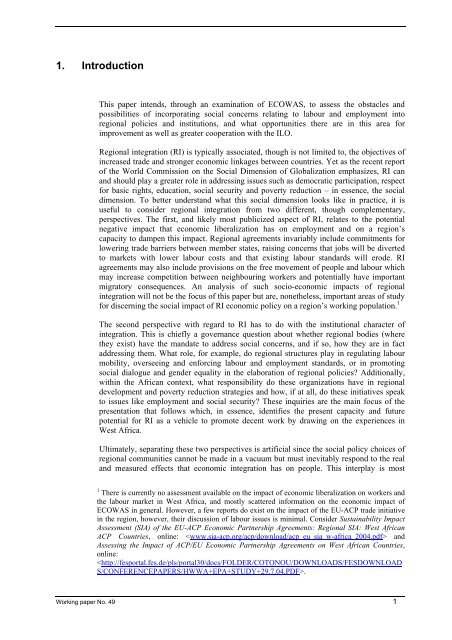The Social Dimension of Regional Integration in ECOWAS
The Social Dimension of Regional Integration in ECOWAS
The Social Dimension of Regional Integration in ECOWAS
Create successful ePaper yourself
Turn your PDF publications into a flip-book with our unique Google optimized e-Paper software.
1. Introduction<br />
This paper <strong>in</strong>tends, through an exam<strong>in</strong>ation <strong>of</strong> <strong>ECOWAS</strong>, to assess the obstacles and<br />
possibilities <strong>of</strong> <strong>in</strong>corporat<strong>in</strong>g social concerns relat<strong>in</strong>g to labour and employment <strong>in</strong>to<br />
regional policies and <strong>in</strong>stitutions, and what opportunities there are <strong>in</strong> this area for<br />
improvement as well as greater cooperation with the ILO.<br />
<strong>Regional</strong> <strong>in</strong>tegration (RI) is typically associated, though is not limited to, the objectives <strong>of</strong><br />
<strong>in</strong>creased trade and stronger economic l<strong>in</strong>kages between countries. Yet as the recent report<br />
<strong>of</strong> the World Commission on the <strong>Social</strong> <strong>Dimension</strong> <strong>of</strong> Globalization emphasizes, RI can<br />
and should play a greater role <strong>in</strong> address<strong>in</strong>g issues such as democratic participation, respect<br />
for basic rights, education, social security and poverty reduction – <strong>in</strong> essence, the social<br />
dimension. To better understand what this social dimension looks like <strong>in</strong> practice, it is<br />
useful to consider regional <strong>in</strong>tegration from two different, though complementary,<br />
perspectives. <strong>The</strong> first, and likely most publicized aspect <strong>of</strong> RI, relates to the potential<br />
negative impact that economic liberalization has on employment and on a region’s<br />
capacity to dampen this impact. <strong>Regional</strong> agreements <strong>in</strong>variably <strong>in</strong>clude commitments for<br />
lower<strong>in</strong>g trade barriers between member states, rais<strong>in</strong>g concerns that jobs will be diverted<br />
to markets with lower labour costs and that exist<strong>in</strong>g labour standards will erode. RI<br />
agreements may also <strong>in</strong>clude provisions on the free movement <strong>of</strong> people and labour which<br />
may <strong>in</strong>crease competition between neighbour<strong>in</strong>g workers and potentially have important<br />
migratory consequences. An analysis <strong>of</strong> such socio-economic impacts <strong>of</strong> regional<br />
<strong>in</strong>tegration will not be the focus <strong>of</strong> this paper but are, nonetheless, important areas <strong>of</strong> study<br />
for discern<strong>in</strong>g the social impact <strong>of</strong> RI economic policy on a region’s work<strong>in</strong>g population. 1<br />
<strong>The</strong> second perspective with regard to RI has to do with the <strong>in</strong>stitutional character <strong>of</strong><br />
<strong>in</strong>tegration. This is chiefly a governance question about whether regional bodies (where<br />
they exist) have the mandate to address social concerns, and if so, how they are <strong>in</strong> fact<br />
address<strong>in</strong>g them. What role, for example, do regional structures play <strong>in</strong> regulat<strong>in</strong>g labour<br />
mobility, oversee<strong>in</strong>g and enforc<strong>in</strong>g labour and employment standards, or <strong>in</strong> promot<strong>in</strong>g<br />
social dialogue and gender equality <strong>in</strong> the elaboration <strong>of</strong> regional policies? Additionally,<br />
with<strong>in</strong> the African context, what responsibility do these organizations have <strong>in</strong> regional<br />
development and poverty reduction strategies and how, if at all, do these <strong>in</strong>itiatives speak<br />
to issues like employment and social security? <strong>The</strong>se <strong>in</strong>quiries are the ma<strong>in</strong> focus <strong>of</strong> the<br />
presentation that follows which, <strong>in</strong> essence, identifies the present capacity and future<br />
potential for RI as a vehicle to promote decent work by draw<strong>in</strong>g on the experiences <strong>in</strong><br />
West Africa.<br />
Ultimately, separat<strong>in</strong>g these two perspectives is artificial s<strong>in</strong>ce the social policy choices <strong>of</strong><br />
regional communities cannot be made <strong>in</strong> a vacuum but must <strong>in</strong>evitably respond to the real<br />
and measured effects that economic <strong>in</strong>tegration has on people. This <strong>in</strong>terplay is most<br />
1 <strong>The</strong>re is currently no assessment available on the impact <strong>of</strong> economic liberalization on workers and<br />
the labour market <strong>in</strong> West Africa, and mostly scattered <strong>in</strong>formation on the economic impact <strong>of</strong><br />
<strong>ECOWAS</strong> <strong>in</strong> general. However, a few reports do exist on the impact <strong>of</strong> the EU-ACP trade <strong>in</strong>itiative<br />
<strong>in</strong> the region, however, their discussion <strong>of</strong> labour issues is m<strong>in</strong>imal. Consider Susta<strong>in</strong>ability Impact<br />
Assessment (SIA) <strong>of</strong> the EU-ACP Economic Partnership Agreements: <strong>Regional</strong> SIA: West African<br />
ACP Countries, onl<strong>in</strong>e: and<br />
Assess<strong>in</strong>g the Impact <strong>of</strong> ACP/EU Economic Partnership Agreements on West African Countries,<br />
onl<strong>in</strong>e:<br />
.<br />
Work<strong>in</strong>g paper No. 49 1

















